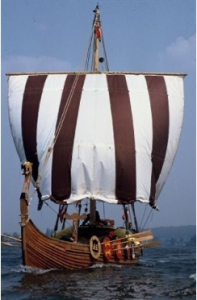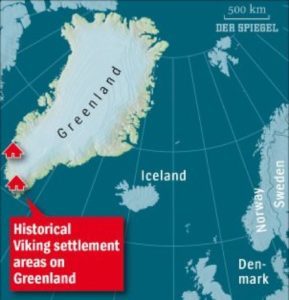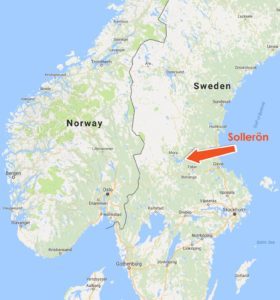Michael E. Wills's Blog
May 19, 2024
Michael Wills Interview
February 26, 2024
The Most Spectacular Viking Success: The Danegeld

Danegeld was essentially a form of extortion. Norsemen were offered a payment, usually in silver, if they agreed to leave England peaceably.
It is said that the first danegeld was paid in the tenth century, to Toste Skagul, a warrior chieftain from West Götaland. A part of Sweden which then belonged to Denmark. There is no record of how much silver he was paid, but we do have a record of later payments, these were truly large and increased over time.
The danegeld was initially paid in the f...
December 14, 2023
Give unto Caesar ….. But what if you have no cash?

Three gospels in the Christian bible refer to an attempt to trick Jesus by asking him if Jewish citizens should pay taxes to the Roman occupiers. He is reported to have asked to see a Roman coin. Showing it to the questioners he pointed to the image of the Roman emperor as said, “Give to Caesar what is Caesar’s and to God what is God’s.”
The Romans had a well-developed system of coinage and taxes could be defined and collected using coins. However, that has not always been the case in history. ...
March 26, 2023
Why swallow a silver bullet?
In 1777 the British put into action a plan to invade America from Canada, first chasing out the American troops besieging Quebec. General Burgoyne’s army was to fight its way to Albany and there to link up with the army under the command of General Howe moving up north from New York. In the event, General Howe decided to abandon the plan and instead to attack Philadelphia. He delegated the task of linking up with General Burgoyne to a small force under the command of General Clinton. Coincidenta...
February 24, 2023
The Winner Takes All! But who was the loser?

The more I read, the more I tend to agree with the saying, “History is written by the victors”. As such, the history I was taught in school, tended to avoid any mention of occasions when the British were not victorious! Hence it was, that while we studied how Britain triumphed over the French, (and Americans), in Canada, very little was taught about the dreadful cost in lives and money, spent by George lll in trying to retain his American colonies.
It was a chance visit to the Redcoats Museum i...
January 8, 2020
The Ulfberht Sword

One of the swords found in the Viking graves on the island of Sollerön in Sweden has a name engraved on it, Ulfberht. It was found in the first grave to be discovered. The temptation is to assume that this was the name of the Viking chieftain whose remains was buried there. Actually, the name is probably the first international “brand name”, ever.
The popular image of a Viking is that of a man with a sword and shield, but in fact, this is far from the truth. Reliable swords were very, very...
January 22, 2019
The first Europeans to visit America
“In fourteen hundred and ninety-two, Columbus sailed the ocean blue”. Yes, he did, but he was not the first European to visit America. In fact, he was 500 years too late to claim that distinction. So, who did cross the Atlantic first?
The Icelandic sagas relate that in 985, a merchant, Bjarni Herjolfsson, was the first European to sight America. His ship was one of a fleet of 25 vessels with around 500 settlers who were emigrating from Iceland to Greenland. He claimed that the fleet was blown...
July 13, 2017
The Last Vikings?
 In 985 AD, an Icelandic Viking, Erik Torvaldsson, lured Norse families into attempting the dangerous 750 mile, (1200 km), passage from Iceland to Greenland. The reason they left Iceland is disputed, but it seems to be related to the scarcity of land on the Island. Such good land as there was, had been claimed by often aggressive and intolerant family clans. Violence was common and although there were some laws to protect the inhabitants, these were often flouted in family feuds.
In 985 AD, an Icelandic Viking, Erik Torvaldsson, lured Norse families into attempting the dangerous 750 mile, (1200 km), passage from Iceland to Greenland. The reason they left Iceland is disputed, but it seems to be related to the scarcity of land on the Island. Such good land as there was, had been claimed by often aggressive and intolerant family clans. Violence was common and although there were some laws to protect the inhabitants, these were often flouted in family feuds.
Erik himself...
April 20, 2017
A Gruesome Discovery

Source: Oxford Archeology
In 2012 the Olympic sailing events were held in Portland, Dorset, UK. In preparation for the Olympics, in order to improve transport links to Portland, a relief road was built over a hill in the Dorset Downs, called “The Ridgeway”. It was during the construction of this road that a completely unexpected archaeological discovery was made.
In 2009, the driver of a mechanical excavator, working on the foundation of the road, noticed bones in the chalky soil in the bucke...
March 10, 2017
Inland Vikings
 During the time of the Vikings and long after, the only way to travel around Scandinavia was by boat. Thick forests or high mountains made overland travel extremely difficult if not impossible. Thus, Viking Age settlements tended to be around coastal areas. Indeed, the most popularly accepted explanation for the word “Viking”, is that it comes from the Norse word, “vik” which means “bay”. They were people who lived around bays with good access to the sea.
During the time of the Vikings and long after, the only way to travel around Scandinavia was by boat. Thick forests or high mountains made overland travel extremely difficult if not impossible. Thus, Viking Age settlements tended to be around coastal areas. Indeed, the most popularly accepted explanation for the word “Viking”, is that it comes from the Norse word, “vik” which means “bay”. They were people who lived around bays with good access to the sea.
Consider therefore my confusion whil...



